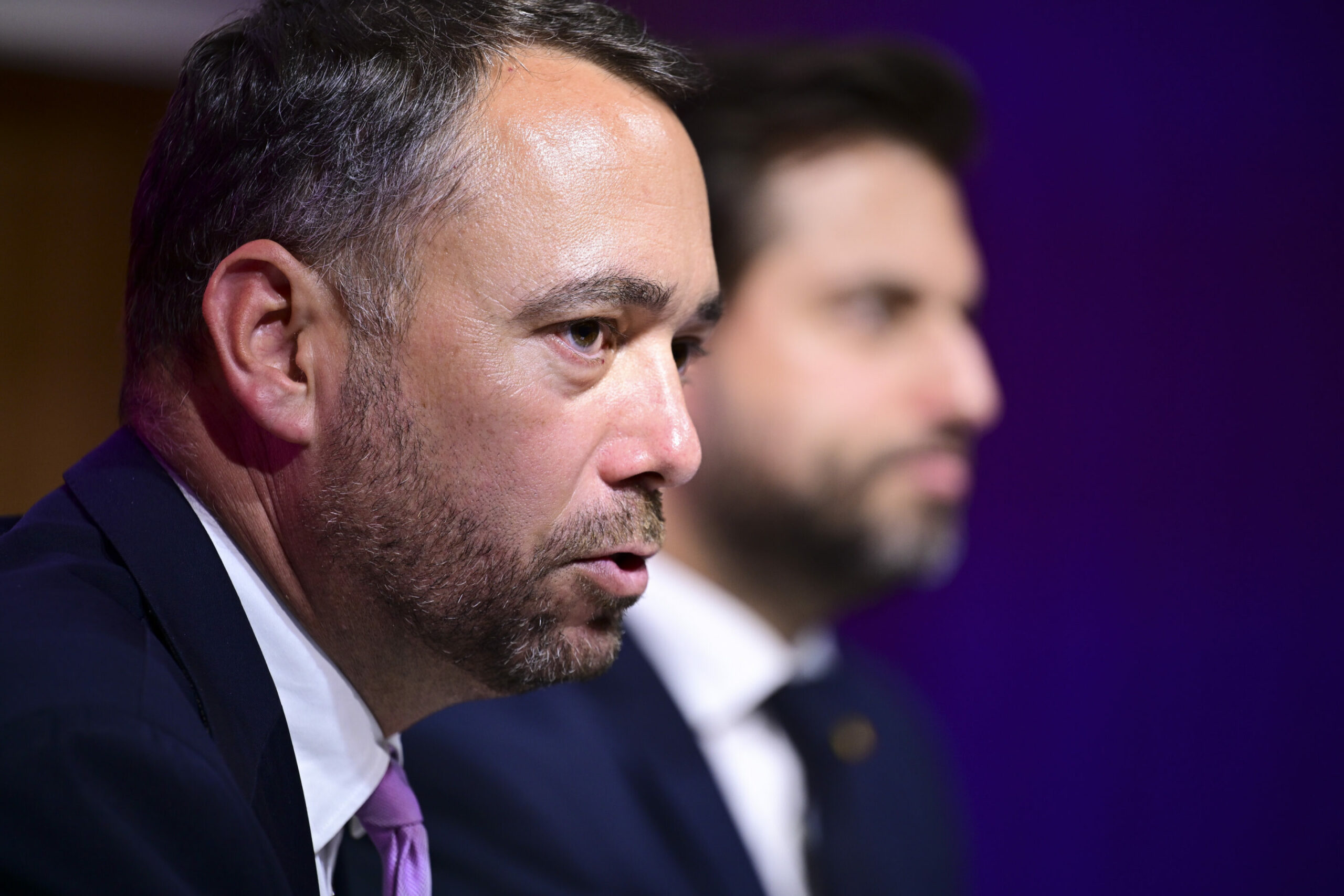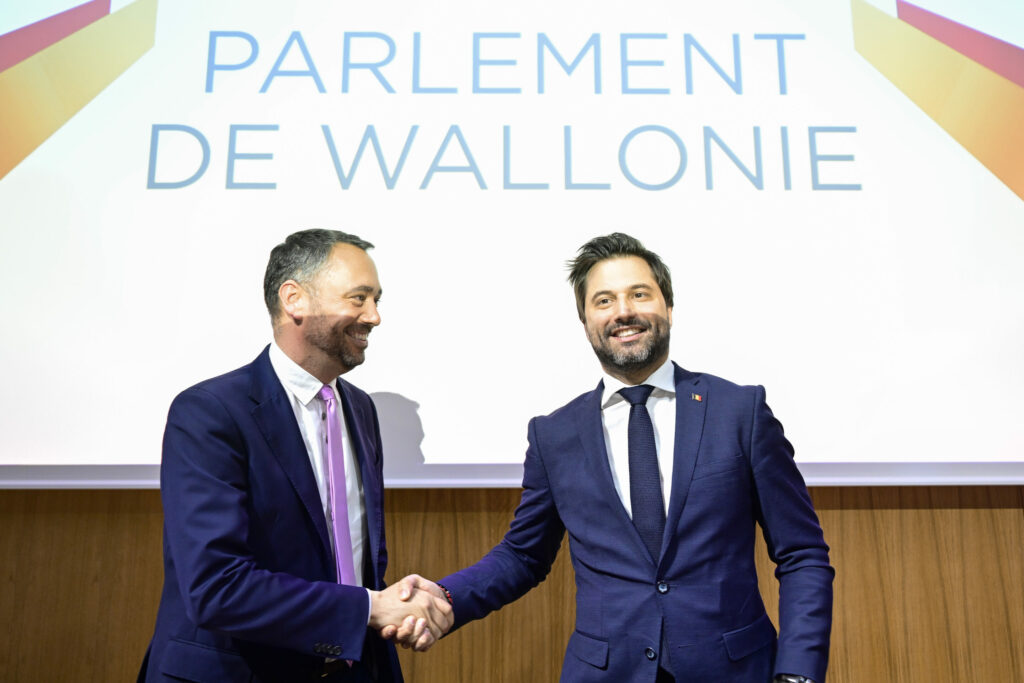After four weeks of negotiating, Georges-Louis Bouchez of the liberal MR and Maxime Prévot of centrist Les Engagés presented the broad outlines of the coalition agreement which the election winners want to implement in Wallonia over the next five years.
It has taken the two party leaders just over one month since the 9 June elections to draw up its coalition agreement. While this is not a record, it demonstrates both Bouchez and Prévot's desire to get to work.
"This is really about a big change, a break with the past. We are going to do things which should have been done decades ago, but were never implemented," Bouchez said.
As a first point, the two party leaders announced that the new Walloon and French-speaking Community Governments must be able to present balanced budgets in ten years.
Responsibility, not austerity
Wallonia currently has a very high debt, which will continue to rise to almost €41 billion in 2025 with unchanged policies, said Bouchez. Therefore, the Walloon Government will outline a path to arrive at a balanced budget in ten years. Over half of the effort should already happen before the next elections (in 2029). The other half is for the five years after that.
"If we wanted to achieve balance as early as 2029, it would have resulted in blood and tears," said Les Engagés leader Maxime Prévot. "We want a responsible approach, not blind savings. This is not austerity."
The necessary reforms will be put into a decree in the next few weeks, Bouchez said. The French-speaking Community – which manages the 'soft' powers such as education – must also move towards a balanced budget within ten years.

MR leader Georges-Louis Bouchez holds a press conference to present the new Walloon Government. Credit: Belga / Laurie Dieffembacq
However, the hole in the budget will not be closed with extra taxes for the Walloons: on the contrary, Walloons will have to pay fewer taxes. According to Bouchez, this is about the "biggest tax cut ever in Wallonia."
The total reduction would amount to €1.5 billion, spread over the next five years. Especially "active young people and the middle class" will be able to benefit from these tax cuts, as they include a reduction in registration duties on a first home to 3% from 2025.
Instead, MR and Les Engagés are counting on cuts to the public administration to structurally reduce the deficit. "We are focusing on core tasks," stressed Bouchez.
Cutting costs
As part of those cuts, the number of ministers will be reduced from 13 to ten – "similar to Flanders," Bouchez said. The number of elected officials is also being decreased, including at the local level, as are the ministerial cabinets.
The two leaders also plan to abolish the provincial councils by 2030. However, this requires a two-thirds majority – which the two parties do not have, but they are "reaching out" to the parties that will be in opposition, Prévot said. The measure will also be put to the Walloon population in a referendum.
Additionally, the green certificates will be phased out, but acquired rights will be preserved.
Other savings are less clear, but "it was never the intention to write a 500-page phone book full of technical details," Prévot explained. He added that the more technical initiatives will come from the competent ministers after they have been appointed and have started their work.

Les Engagés leader Maxime Prévot and MR leader Georges-Louis Bouchez hold a press conference to present the new Walloon Government. Credit: Belga /Laurie Dieffembacq
Another important point in the coalition agreement is tackling unemployment. Wallonia's unemployment rate is 12.1% – almost double that of Flanders. The new government will therefore prioritise getting more people into work.
To that end, they will completely reform the Forem employment service (the Walloon counterpart of Flanders' VDAB and Brussels' Actiris). MR and Les Engagés also want to limit unemployment to two years. After that, people will no longer receive unemployment benefits.
However, limiting unemployment in time is a federal competence and can therefore not be introduced by Wallonia alone. As both parties are involved in the Federal Government as well, they will likely push for the measure to be adopted across the country. In the meantime, they will "make preparations" to prepare Wallonia for such a limitation.
Childcare and education
As in Flanders, there is a shortage of places in Walloon childcare, which is why the new government is setting itself the target of creating 5,000 extra places during its five-year legislature. Working parents will be given priority.
To better protect the mental well-being of young people, MR and Les Engagés are coming up with a striking measure: they will introduce a decree (the term for a regional law) to ban smartphones in primary schools.
"Doctors are pointing to the devices as a source of sleep and concentration problems," Prévot said. He added that parents, teachers and headmasters are concerned about the increasingly prominent place smartphones and tablets occupy in playgrounds and classrooms.
This measure means that French-speaking pupils up to 12 years old will not be allowed to bring their smartphones to lessons. For secondary education, Prévot referred to the autonomy of schools, although urged "balanced use."
Related News
- Francophone governments are formed: MR and Les Engagés reach agreement
- De Wever aims for a Federal Government by 20 September
- Brussels four-party coalition Dutch-speaking side 'most realistic,' says Van den Brandt
The two party leaders ended the press conference by making clear that they had not yet decided on the ten ministerial posts in Wallonia's new regional government. Negotiations will take place over the coming days.
"You still have a few days to speculate," Bouchez joked to the gathered reporters. "Whoever the ministers will be, they will bear a huge responsibility. The next five years will be the most important in the history of Wallonia."

